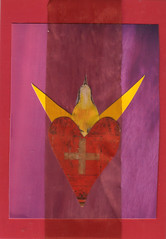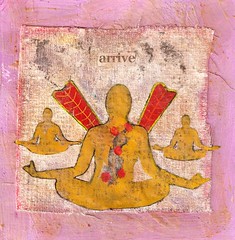 How many of you find that it takes a long time to relax and let go during a massage session?
How many of you find that it takes a long time to relax and let go during a massage session?For some, the first massage stroke makes them melt into a soft mass of muscle, the massage table bearing the weight of their relaxed frame. And for others, my partner included, not only does relaxation seem to come instantaneously, but sleep also comes full force.
For many, however, relaxation does not come easily, especially after an accumulation of stressors throughout the day.
In our culture, we learn how to juggle many tasks at once, pick up the pace, and become more efficient, but we don't learn the art of slowing down and letting go. How many office managers are told: "Don't worry about the budget deadline; instead, focus on your breathing and turn in the documents when you feel aligned with the budget in your body and when you mentally resonate with doing so"?
No wonder it takes some conscious attention and a bit of effort to allow our bodies and minds to relax. And there's no sense in yelling at ourselves: "Relax!" I went to a massage therapist once who, when noticing my arms were holding, reprimanded me by saying, "Can't you just relax?" Not helpful. And as you can imagine, my arms and shoulders tensed up even more.
It's a delicate process to let go, and it takes a sensitive massage ther
 apist to encourage this process without pressuring the client. Relaxation should be a gentle process, somewhat like letting go of a an object you've been holding onto tightly without knowing it. Gradually, you allow yourself to loosen your grip.
apist to encourage this process without pressuring the client. Relaxation should be a gentle process, somewhat like letting go of a an object you've been holding onto tightly without knowing it. Gradually, you allow yourself to loosen your grip.There are many reasons relaxation may take its sweet time. Here are a few ways to gently calm your system during a massage session:
Mental Chatter.
I think it's important to honor our mental chatter. It's there for a reason: we're problem solving, processing, and recounting as a way to better understand ourselves and our experiences. But I also believe that we can honor the voice inside us by letting it take a rest. We can tell this voice, "Yes, I hear you and you are important, but I need you to whisper now, and perhaps even pause once and again so I can focus on the needs of my body." I've had clients feel frustrated for "thinking too much" during a session, which has a tendency to increase tension. When I have this experience, I try to treat my chatter as gently as I would an eager child: I encourage a quiet voice and perhaps even nap time, but I honor this need for expression.
Try this:
Breath work is one of the most powerful ways I have found for quieting the mind. And focusing your breath down into your body is especially helpful. Instead of keeping your breath up in your chest and throat, try bringing it down into your belly and hips, and then see if you can send your breath all the way down to your toes. By focusing your energy away from your head during deep breathing, you may find that a new voice emerges-- the voice of your body.
Emotional Holding.
I believe that emotional pain and stress accumulate in our bodies. Sometimes our tight shoulders or neck pain, for example, are holding our grief or worry or anxiety. I often ask my c
 lients where they experience stress or anxiety in their bodies. The process of listening to the body is the first step in healing this area. In a sense, by identifying where we hold our stress, we are in effect telling this area, "I hear you. I feel you." This acknowledgement may be key in releasing tension and emotional pain.
lients where they experience stress or anxiety in their bodies. The process of listening to the body is the first step in healing this area. In a sense, by identifying where we hold our stress, we are in effect telling this area, "I hear you. I feel you." This acknowledgement may be key in releasing tension and emotional pain.Try this:
Identify what emotions are surfacing for you, whether they be sadness or frustration. Scan your body and notice where you are holding this emotion. Often times we feel tight or constricted in this area. Now, just notice what this emotion feels like from the inside of your body. Does it have a color or texture? Is it hot or cold? Is it stagnant or does it move? If specific stressful thoughts emerge in your mind, acknowledge them but set them aside, like you are stacking books. You know you can read them later. But for now, you are just noticing. Allow yourself to follow the discomfort as it fades with each breath, as it begins to move out of your body.
Muscle Guarding.
When we hold our muscles in the same position over time, they get accustomed to this position. For example, if I work at a computer regularly, my muscles begin to follow the pattern I am providing for them. My pec muscles may get tight and my back and neck feel tight and overstretched. It's no wonder that it may take my muscles a while to adjust to a new way of being. And if we add a layer of past trauma to the mix, such as an injury, our muscles hold tight even more as a way to protect against pain. During a massage session, it can feel physically difficult to let go, which is why I often gently jostle my clients arms, for example, to stop the cycle of predictability. It's rather like tricking the muscles into a new paradigm.
Try this:
Do a full body shake-out when you get home after work. Shake out your arms and legs thoroughly, and rotate your pelvis, hips, and neck. Next, give your body a new position. So, for example, if you were typing at a computer all day, you might lie on your back on the floor or on a balance ball and stretch your arms back and above your head. This shouldn't be a strenuous stretch, but a gentle positioning that re-educates your body.


